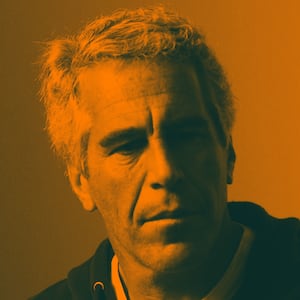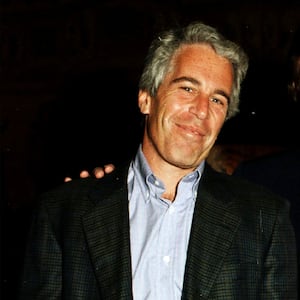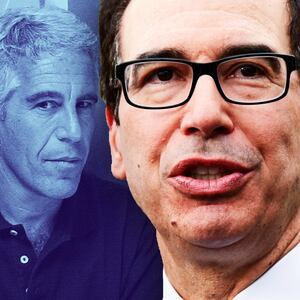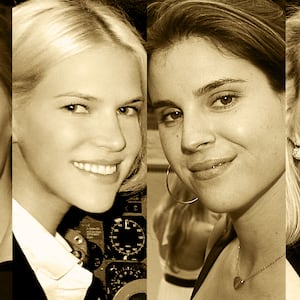Survivors of Jeffrey Epstein’s trafficking ring are outraged by a new government report that says former U.S. Attorney Alex Acosta only “exercised poor judgment” when he authorized the financier’s secret, lenient plea deal 13 years ago.
Last week, the FBI met with victims and their lawyers for a first look at the Department of Justice report, which found that federal prosecutors in Florida didn’t commit “professional misconduct” when they declined to prosecute Epstein—or when they failed to notify victims before or after negotiating a deal with his lawyers.
A copy of the 350-page report obtained by The Daily Beast reveals the DOJ’s Office of Professional Responsibility also found Acosta didn’t violate any policies by granting immunity to Epstein’s unnamed “potential co-conspirators.”
ADVERTISEMENT
For Virginia Roberts Giuffre, who was sexually abused by Epstein in Florida and multiple other locations around the world from 1999 to 2002, the inquiry feels like another “injustice on top of everything we went through.”
“We just want to say our piece,” Giuffre told The Daily Beast. “This was not a fair fight. So many lives could have been saved if we had been heard by the court. In 2006 and 2007, when all this started going on, we should have all been notified.
“If that had come to light, Jeffrey would have been in bars in 2007,” Giuffre said. “He would still be in jail right now.”
Michelle Licata, who was 16 when Epstein abused her in 2004, was also among 30 victims identified by the FBI. She wanted Epstein prosecuted back then, and in July 2019, she traveled to New York to see him arraigned on child sex-trafficking and conspiracy charges.
Licata and Giuffre belong to a group of self-described “survivor sisters” who’ve united after Epstein’s arrest and his subsequent death in a Manhattan lockup. They’re speaking out to demand accountability not only for Epstein’s alleged accomplices, but also for the authorities who failed to prosecute the wealthy sex-offender, who molested and raped scores of underage girls and young women since the 1990s.
“We have fought, cried and stood together to bring justice for survivors all over the world,” Licata told The Daily Beast. “When it didn't seem possible, we did the impossible. Speaking loud and proud, we turned in one of the biggest child sex-trafficking pedophiles this world has ever known.
“We left it in the hands of prosecutors who would soon let this same man walk free,” Licata added. “Now years later we still fight for that same justice while our own justice system takes the easy way out and ends the investigation because it was only a ‘poor judgment’ call.”
Survivors abused by Epstein in New York also say they’re angry about the Justice Department absolving Acosta and federal prosecutors of any misconduct.
“Poor judgment is staying up too late when you have an early appointment,” said Teresa Helm, who was assaulted by Epstein in 2002. “This isn’t poor judgment, this is an extreme violation of justice.”
“Epstein was a predator. His enablers are predators. They were given several free passes when our government had the capability to stop them in their tracks,” Helm told The Daily Beast.
“Perhaps they’ve wrapped it up and called it a day on this, we have not,” Helm added. “Our day will come to light.”
In addition to Acosta, OPR investigated four other prosecutors for its report: Criminal Division Chief Matthew Menchel, deputy chief Andrew Lourie, First Assistant United States Attorney Jeffrey Sloman, and assistant U.S. Attorney Marie Villafaña.
According to the OPR report, none of the prosecutors “violated a clear and unambiguous standard or engaged in professional misconduct in developing, negotiating, or entering into” Epstein’s non-prosecution agreement (NPA). The office also discovered no policy barring prosecutors from providing immunity to Epstein’s potential co-conspirators.
But the report illustrates how FBI agents and lead prosecutor Villafaña tried to keep the investigation alive—tracking down potential leads in New York and the U.S. Virgin Islands, and trying to obtain Epstein’s missing computers—while her supervisors stalled efforts to prosecute the perverted financier.
Indeed, the report says the FBI was ready to arrest Epstein in May 2007, while he was in the U.S. Virgin Islands serving as a judge in a beauty pageant.
The report says that “although there were evidentiary and legal challenges to a successful federal prosecution, Acosta prematurely decided to resolve the case without adequately addressing ways in which a federal case potentially could have been strengthened, such as by obtaining Epstein’s missing computer equipment.”
Acosta began negotiating with Epstein’s camp before the investigation was complete, and FBI agents “continued to locate additional victims, and many had not been interviewed by the FBI by the time of the initial offer,” the report says.
“In other words, at the time of Acosta’s decision, the [U.S. Attorney’s Office] did not know the full scope of Epstein’s conduct; whether, given Epstein’s other domestic and foreign residences, his criminal conduct had occurred in other locations; or whether the additional victims might implicate other offenders,” the document adds.
Giuffre, who launched the nonprofit Victims Refuse Silence to support trafficking victims, said Acosta owes an apology to survivors of Epstein’s abuse, and that the Justice Department needs new rules to ensure this doesn’t happen to other victims.
“We all know Epstein did not act alone and the many cruel individuals who also sexually abused and assaulted me are given a ‘Get Out of Jail Free’ card,” Giuffre said, adding: “That’s not justice, that’s not the way justice should work, but unfortunately it is what happened and the investigation into this only showed ‘poor judgment.’”
Marijke Chartouni, who read the full report, said she and fellow survivors are “collectively outraged” by the findings. The former model says she was 20 when a friend brought her to Epstein’s Manhattan mansion in 2000 and he assaulted her. “It's apparent from the report that the interests of the Southern District of Florida prosecutors’ office were not aligned with that of the Justice Department,” she said.
Chartouni added that the OPR report “was not an easy read” and that “the scapegoating of Acosta seems both shortsighted and self-serving, as he couldn’t have acted alone.”
In November 2018, a Miami Herald investigation highlighted Acosta’s role in drafting Epstein’s NPA. Acosta resigned as President Trump’s Labor Secretary months later following a public outcry over Epstein’s lenient treatment.
“Had Secretary Acosta known then what he knows now, he certainly would have directed a different path,” read a statement released by Acosta’s attorney last week. “But as OPR makes clear, neither he nor his staff had the benefit of the record available today to craft their strategy to handle a legally and factually challenging case.”
Acosta told OPR his office was only serving as a “backstop” to a weak state prosecution and as a federal prosecutor, he didn’t want to overstep his bounds. (In July 2006, the state charged Epstein with felony solicitation of prostitution. But fearing that local prosecutors had caved to pressure from Epstein’s lawyers, Palm Beach cops took their case to the FBI.)
Around July 2007, Acosta agreed to offer Epstein two years in prison for crimes that could have landed him decades behind bars if he was convicted. But Epstein’s attorneys rejected any deal that included prison time and insisted on home confinement. Epstein ultimately served 13 months of an 18-month sentence in the private wing of a county lockup, mostly on work release. He continued to abuse victims during his jail stint.
“We must keep in mind that Jeffrey Epstein is a 54-year-old man who has never been arrested before,” defense lawyer Lilly Ann Sanchez wrote in a letter to Menchel. “He has lived an otherwise exemplary life.”
The report indicates Villafaña waged a legal battle to obtain Epstein’s computer equipment, which was removed from his mansion before Palm Beach cops executed a search warrant. She also informed Acosta in August 2007 that she wanted to interview Epstein’s assistants, colleagues and former employees based in New York. Acosta delayed those investigative steps pending the NPA negotiations with Epstein’s counsel.
“Villafaña suspected the computers contained evidence that ‘would have put this case completely to bed,’” the OPR report notes. “She believed that access to the computer evidence would strengthen the government’s negotiating position, but that her supervisors ‘did not seem to recognize that.’”
Villafaña told OPR she believed Epstein’s computers contained child pornography, and that the FBI received intel that Epstein had outfitted his New York residence with hidden cameras to record his sexual encounters. One victim also told FBI agents that Epstein’s assistant photographed her in the nude.
Acosta, Menchel, and Lourie told OPR they didn’t remember Villafaña’s fight for computer evidence. But Lourie added the computers might have held “very powerful evidence” that could have altered Acosta’s decision-making on the case.
Meanwhile, the OPR report cited emails depicting a cordial relationship between government lawyers and Epstein’s counsel. Before the NPA was finalized in late 2007, Epstein attorney Jay Lefkowitz emailed Lourie about the feds notifying Palm Beach Police Chief Michael Reiter of Epstein’s deal: “I am very concerned about leaks unduly prejudicing Jeffrey [Epstein] in the media,” Lefkowitz wrote, before adding, “I have enjoyed working with you on this matter.” Lourie replied the U.S. Attorney’s Office was only notifying Reiter “so he does not find out about it in the paper” and continued, “I enjoyed it as well. Mr. Epstein was fortunate to have such excellent representation.”
Lawyers on opposite sides of the Epstein case were friends or former coworkers—and, in one instance, previously had a fling. Guy Lewis, a former federal prosecutor in Miami, contacted Acosta’s office on Epstein’s behalf. The OPR report noted Villafaña and Lourie once worked under Lewis, and Lourie was close to a partner at Lewis’s firm.
Menchel previously dated Sanchez in 2003, when they both worked in the U.S. Attorney’s Office. He told OPR they had a “social relationship” that involved “a handful of dates over a period of two to three weeks.” Menchel added, “We decided that . . . this was probably best not to pursue, and we mutually agreed to not do that.”
For his part, Menchel said prosecutors realized Epstein chose lawyers he imagined held sway within Acosta’s office, but prosecutors considered this strategy “ham-fisted” and “clumsy” and said it wasn’t going to “change anything.”
Yet in a 2018 email, Villafaña claimed the two-year prison sentence initially proposed in Epstein’s agreement “was developed by Menchel as a favor to” Sanchez—an accusation the OPR report claimed had “no merit.”
OPR underscored potential conflicts of interest with Acosta, too. Sometime in 2008, after Epstein’s NPA was signed, Acosta was “considering seeking a visiting professorship at Harvard Law School,” which employed Epstein attorney Alan Dershowitz. OPR and the U.S. Attorney’s Office were evaluating whether Acosta should recuse himself from the Epstein case because of this, and in May 2008, the Justice Department “advised that these facts provided no basis for recusal.”
Dershowitz helped Epstein fend off the 2006 state case, as well as the 2007 federal indictment. He presented state prosecutors with dossiers on Epstein’s victims in an effort to undercut their credibility. “We’re going to destroy your witnesses; don’t go to court because we’re going to destroy those girls,” Dershowitz reportedly told State Attorney Barry Krischer. (Giuffre and another accuser named Sarah Ransome claim Dershowitz sexually abused them in connection to Epstein’s scheme—allegations Dershowitz adamantly denies, as he battles Giuffre in a defamation suit filed last year.)
Acosta did finally recuse himself in December 2008, while he contemplated leaving the U.S. Attorney’s Office for a job at Kirkland & Ellis, the firm of Epstein’s lawyers Lefkowitz and Kenneth Starr. Acosta once worked with them as a junior associate. While Epstein was already serving his jail sentence, Acosta “was formally recused from all matters involving the law firm of Kirkland & Ellis … because Acosta had begun discussions with the firm about possible employment,” the OPR report says.
In late 2008, the report adds, Acosta “recognized the conflict of interest and instructed Sloman to stop copying him on emails relating to the Epstein matter.”
The OPR report also addressed the NPA’s unusual provision that protected “any potential co-conspirators of Epstein,” including four of his female assistants: Sarah Kellen, Adriana Ross, Lesley Groff, and Nadia Marcinkova.
Villafaña told OPR she agreed to the immunity clause because she believed those women were the only “co-conspirators” in the case. She said she didn’t think the provision might be used to protect Epstein’s famous friends; none of the victims, she claimed, told authorities about sexual activity with Epstein’s celebrity pals.
At the time, Epstein’s alleged accomplice Ghislaine Maxwell was on the FBI’s radar but authorities didn’t have evidence against her. “Villafaña acknowledged that investigators were aware of Epstein’s longtime relationship with a close female friend who was a well-known socialite, but, according to Villafaña, in 2007, they ‘didn’t have any specific evidence against her,’” the OPR report says. A footnote adds: “The FBI had interviewed one victim who implicated the female friend in Epstein’s conduct, but the conduct involving the then minor did not occur in Florida.”
Still, the report called the NPA’s immunity provision “troubling” and said prosecutors didn’t give “careful consideration to the potential scope of the provision or whether it was warranted given that the investigation had been curtailed and [the U.S. Attorney’s Office] lacked complete information regarding possible co-conspirators.”
Epstein signed the NPA in September 2007, but his lawyers delayed his guilty plea and lobbied the Department of Justice to quash the agreement entirely.
In January 2008, Villafaña told Acosta she wanted to regroup with Epstein’s Florida victims, interview accusers in New York and one from a foreign country, and make contact with “potential sources of information” in the Virgin Islands. She likewise wanted to revive legal proceedings to obtain Epstein’s computers.
But the DOJ declined to intervene in the NPA, and Epstein entered a guilty plea in Palm Beach on June 30, 2008. He was convicted of two state felonies: solicitation of prostitution and procurement of a minor to engage in prostitution. None of his victims were present.
One week later, a survivor named Courtney Wild filed an emergency petition against the DOJ, alleging the feds violated her rights under the Crime Victims’ Rights Act. The ensuing litigation continues to this day. Earlier this year, an Eleventh Circuit Court of Appeals panel ruled the CVRA doesn’t apply to Epstein’s victims in Florida because “the government never filed charges or otherwise commenced criminal proceedings against Epstein.” A hearing before the full court is scheduled for December.
Acosta would later refer to Epstein’s plea as a “proud moment,” the OPR report notes, while Villafaña told a colleague: “After all the hell they put me through, I don’t feel like celebrating 18 months. He should be spending 18 years in jail.”
Villafaña also unsuccessfully fought the money manager's “work release” privileges, which allowed him to leave the jail for 12 hours a day, six days a week to work at his dubious charity, the Florida Science Foundation.
In December 2008, Villafaña contacted the Palm Beach Sheriff’s Office to warn that Epstein was not eligible for work release and that his application for the program contained false information. Months later, Dershowitz met with Sloman to persuade the feds to back off.
Dershowitz, in a March 2009 email, described the meeting as “a relaxed drink and conversation” about the Epstein case. After the rendezvous, Dershowitz wrote Sloman to say he was happy with Sloman’s “assurance that the feds will not interfere with how the Palm Beach sheriff administers” Epstein’s jail sentence “as long as he is treated like any similarly situated inmate,” the OPR report says.
Sloman responded, in part: “...this does not mean that [the U.S. Attorney’s Office] condones or encourages the [sheriff’s office] to mitigate the terms and conditions of his sentence. Furthermore, it does not mean that, if contacted for our position concerning alternative custody or in-home detention, we would not object. To be clear, if contacted we will object.”
Dershowitz followed up with Sloman in an email one week later, thanking him for his “willingness to call the sheriff and advise him that your office would take no position on how he handled Epstein’s sentence.”











